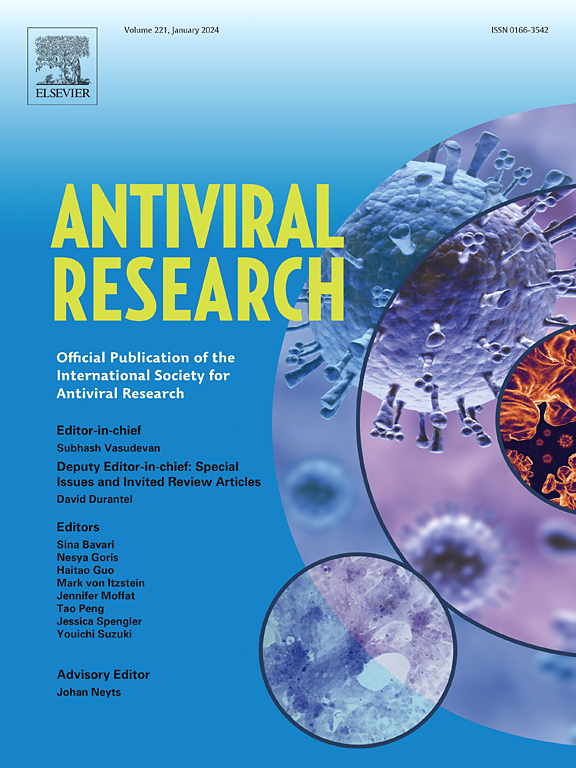Lipid-targeting antiviral strategies: Current state and future perspectives
IF 4.5
2区 医学
Q1 PHARMACOLOGY & PHARMACY
引用次数: 0
Abstract
There is an urgent need for antiviral compounds effective against currently known and future viral threats. The development of host-targeting antivirals (HTAs) appears as an alternative strategy to fight viral infections minimizing the potential of resistant mutant development and potentially leading to the identification of broad-spectrum antiviral agents. Among the host factors explored for HTA strategy, lipids constitute an attractive target as many viruses, even genetically diverse, hijack specific lipids during their lifecycle. Multiple repurposing efforts have been performed to analyze the antiviral properties of lipid-targeting compounds. These studies include the analysis of the effects of cholesterol lowering drugs such as statins, cholesterol transport inhibitors, sphingolipid modulators, de novo lipogenesis inhibitors blocking fatty acid synthesis, compounds targeting glycerophospholipids or drugs interfering with lipid droplet metabolism. This review is focused on the current status of lipid-based or lipid-targeting antiviral strategies and their potential for the development of antiviral therapies, with special emphasis on those studies that have reached advanced stages of development such as efficacy studies in animal models or clinical trials. Whereas there is still a long way to go, multiple proof-of-concept studies and clinical evidence reinforce the therapeutic potential of these strategies warranting their further development into effective antiviral therapies.

脂质靶向抗病毒策略:现状与未来展望
迫切需要能够有效对抗当前已知和未来病毒威胁的抗病毒化合物。宿主靶向抗病毒药物(hta)的发展似乎是对抗病毒感染的另一种策略,可以最大限度地减少耐药突变体发展的可能性,并有可能导致广谱抗病毒药物的鉴定。在探索HTA策略的宿主因子中,脂质构成了一个有吸引力的靶标,因为许多病毒,即使是遗传多样性的,在其生命周期中也会劫持特定的脂质。为了分析脂质靶向化合物的抗病毒特性,已经进行了多次重新利用的努力。这些研究包括分析降胆固醇药物的作用,如他汀类药物、胆固醇转运抑制剂、鞘脂调节剂、阻断脂肪酸合成的新生脂肪生成抑制剂、靶向甘油磷脂的化合物或干扰脂滴代谢的药物。本文综述了基于脂质或靶向脂质的抗病毒策略的现状及其在抗病毒治疗方面的发展潜力,特别强调了那些已经达到晚期发展阶段的研究,如动物模型或临床试验的疗效研究。尽管仍有很长的路要走,但多项概念验证研究和临床证据加强了这些策略的治疗潜力,保证了它们进一步发展成为有效的抗病毒疗法。
本文章由计算机程序翻译,如有差异,请以英文原文为准。
求助全文
约1分钟内获得全文
求助全文
来源期刊

Antiviral research
医学-病毒学
CiteScore
17.10
自引率
3.90%
发文量
157
审稿时长
34 days
期刊介绍:
Antiviral Research is a journal that focuses on various aspects of controlling viral infections in both humans and animals. It is a platform for publishing research reports, short communications, review articles, and commentaries. The journal covers a wide range of topics including antiviral drugs, antibodies, and host-response modifiers. These topics encompass their synthesis, in vitro and in vivo testing, as well as mechanisms of action. Additionally, the journal also publishes studies on the development of new or improved vaccines against viral infections in humans. It delves into assessing the safety of drugs and vaccines, tracking the evolution of drug or vaccine-resistant viruses, and developing effective countermeasures. Another area of interest includes the identification and validation of new drug targets. The journal further explores laboratory animal models of viral diseases, investigates the pathogenesis of viral diseases, and examines the mechanisms by which viruses avoid host immune responses.
 求助内容:
求助内容: 应助结果提醒方式:
应助结果提醒方式:


